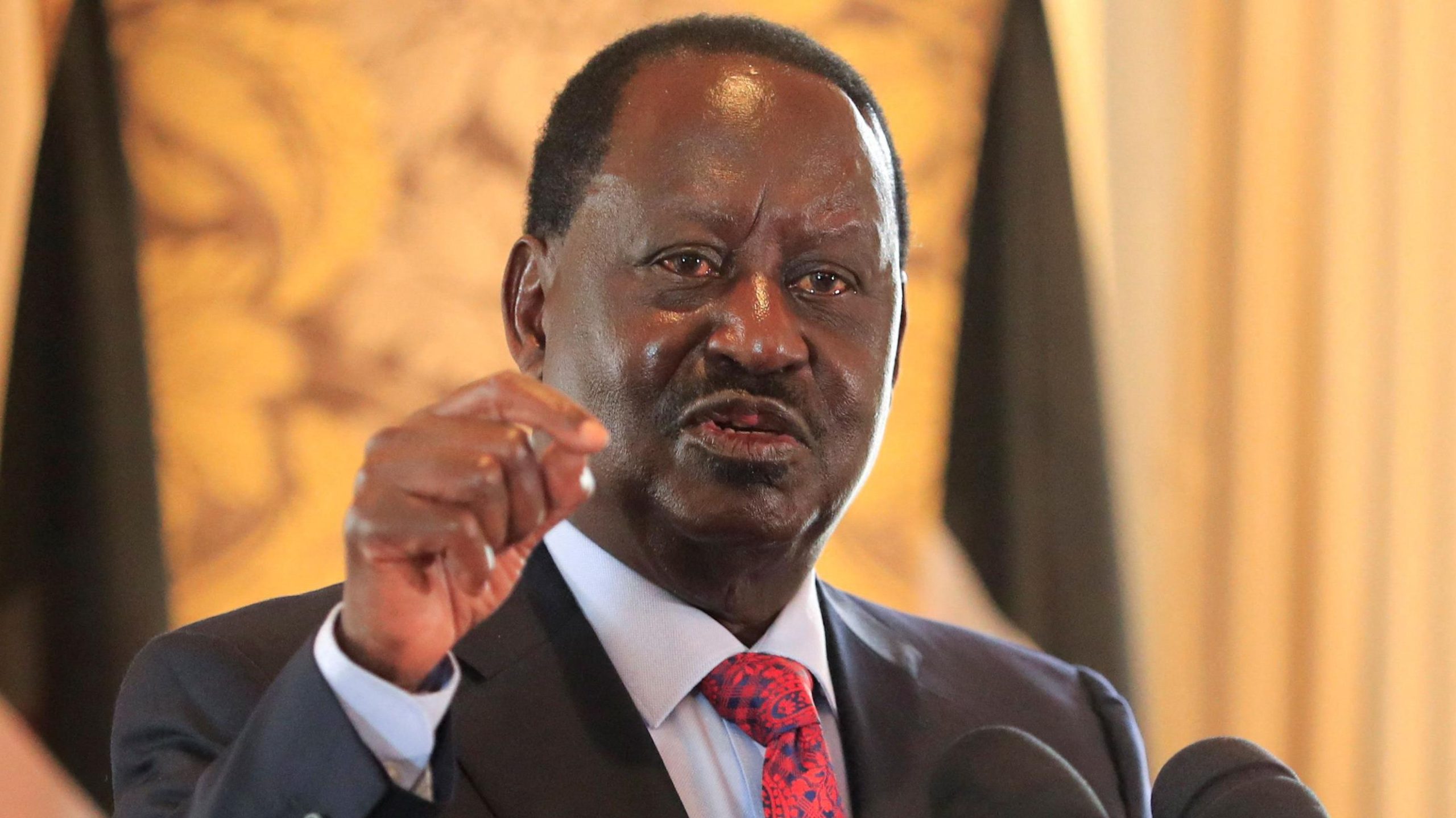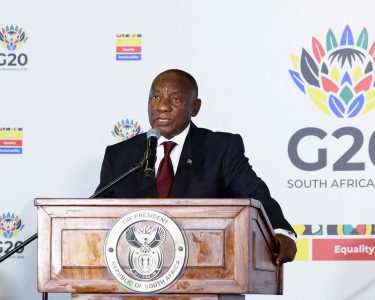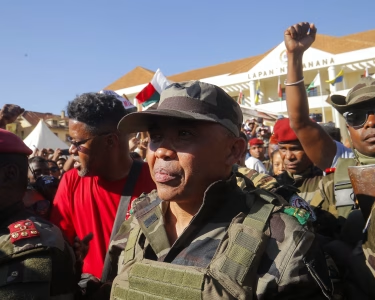- Summary
- Odinga died while in India for medical treatment
- Veteran politician lost five presidential bids
- Played key role in drafting Kenya’s constitution
- Spent nine years in jail, including solitary confinement
NAIROBI, Oct 15 (AfrikTimes) – Kenya’s veteran opposition leader Raila Odinga, who was imprisoned multiple times while fighting one-party autocracy and ran five times unsuccessfully for president, died aged 80 on Wednesday in India. Odinga had been receiving medical treatment abroad and suffered a cardiac arrest, according to the hospital in the city of Kochi where he died.
He was for decades at the heart of Kenyan politics, striking alliances with former foes, serving as prime minister for a term, and inspiring lifelong loyalty from his base in western Kenya and in the capital Nairobi. Odinga’s ability to work with rivals earned him the nickname “Agwambo” (“mysterious one”) in the Luo language. Supporters called him “Baba” (“father” in Swahili), refusing to turn their back even when he was accused of exploiting ethnic divisions for political gain or of striking deals with opponents for the sake of personal power.
 People gather outside a morgue at the Government Medical College Ernakulam, where the body of former Kenyan Prime Minister Raila Odinga, who died today, while visiting India for medical treatment, is kept, in Kochi, India October 15, 2025.
People gather outside a morgue at the Government Medical College Ernakulam, where the body of former Kenyan Prime Minister Raila Odinga, who died today, while visiting India for medical treatment, is kept, in Kochi, India October 15, 2025.
Upon news of his passing, hundreds of supporters from the Nairobi slum of Kibera, many crying and waving twigs to ward off bad omens, made their way in a procession to Odinga’s family home in the capital’s upscale Karen suburb. Crowds also gathered in the lakeside town of Kisumu and the Rift Valley town of Eldoret where Odinga was popular.
His legacy as a democracy activist over the years helped seal two of Kenya’s most important reforms: the establishment of multiparty democracy in 1991 and the adoption of a new constitution in 2010. Odinga also led protests after a disputed 2007 vote plunged Kenya into its most serious political violence since independence. About 1,300 people were killed and hundreds of thousands were displaced in fighting largely between Odinga’s Luo tribe and then-President Mwai Kibaki’s Kikuyus, the largest and richest group. Violence also followed the 2017 vote. Odinga later remarked: “Each community believes that they are not safe unless their man is at the top”.
PRISON ‘A GOOD SCHOOL’
Odinga was the son of Oginga Odinga, Kenya’s first vice-president under independence leader Jomo Kenyatta. The fathers’ rivalry continued with their sons. Despite his family’s extensive business interests, Odinga spent his early years as a left-wing firebrand, naming his son Fidel in honour of the Cuban Communist leader Fidel Castro. Odinga was first imprisoned in 1982 after a coup attempt against then-President Daniel arap Moi, whose government jailed, tortured and murdered opponents. He served a total of nine years in jail, six in solitary confinement, a period he later described as a good school.
 People mourn the death of Former Kenyan Prime Minister Raila Odinga, on Ngong Road, Nairobi, Kenya, October 15, 2025.
People mourn the death of Former Kenyan Prime Minister Raila Odinga, on Ngong Road, Nairobi, Kenya, October 15, 2025.
“Detention is a good school. You learn to reflect and think,” Odinga told Reuters in 2007. “You also learn tolerance, to be forgiving, particularly against your adversaries.”
Odinga first won his parliamentary seat in 1992, which included Kibera. He held the constituency until 2013. His bright orange Hummer was famously mobbed whenever it navigated the muddy lanes of the sprawling Nairobi slum.
He lost his first presidential bid in 1997 to Daniel arap Moi. Four years later, Odinga joined forces with Moi to form a coalition government—a move some viewed as opportunistic, though Odinga defended it as pragmatic. “Democratisation is not like an instant coffee you brew and drink at the same time. It is a process,” he said at the time.
 A woman reacts as she mourns the death of Former Kenyan Prime Minister Raila Odinga, on Ngong Road, Nairobi, Kenya, October 15, 2025.
A woman reacts as she mourns the death of Former Kenyan Prime Minister Raila Odinga, on Ngong Road, Nairobi, Kenya, October 15, 2025.
This pattern of breaking and forging alliances with rivals continued over the next two decades. In 2008, he became prime minister in a national unity government headed by his former foe, Kibaki, as part of a deal to end the bloodshed following the disputed 2007 election. After the 2017 vote, Odinga reconciled with then-President Uhuru Kenyatta in the widely publicized “Handshake”, demonstrating his consistent political pragmatism.
He lost the 2022 presidential election to William Ruto and challenged the results in court, but the Supreme Court upheld Ruto’s victory. Undeterred, Odinga, then in his late seventies, launched street protests against the government. By 2024, he struck a political pact with Ruto, effectively leaving Kenya without an official opposition—a familiar pattern in his political playbook.
TRIBUTES
Ruto visited Odinga’s home on Wednesday morning and announced seven days of national mourning. Deputy President Kithure Kindiki said a state funeral would be held on Friday.
“He championed reforms that gave birth to the rights and freedoms we hold dear today, his voice spoke for the oppressed. His conviction inspired generations, and his vision shaped the course of our history,” Ruto said in an address to the nation.
 People react as they mourn the death of Former Kenyan Prime Minister Raila Odinga, on Ngong Road, Nairobi, Kenya, October 15, 2025.
People react as they mourn the death of Former Kenyan Prime Minister Raila Odinga, on Ngong Road, Nairobi, Kenya, October 15, 2025.
Tributes to Odinga also flowed in from abroad, especially around Africa where he was a well-known figure. “H.E. Raila Odinga was a towering figure in Kenya’s political life and a steadfast champion of democracy, good governance, and people-centred development,” said African Union Commission head, Mahmoud Ali Youssouf, who defeated Odinga in the bloc’s leadership contest this year.
Among Kenyans, opinions were divided over his legacy. “May his fight for democracy continue to inspire our nation’s leaders,” said Nairobi resident Grace Mbugua. Accountant Patrick Mungai added, “He may not have had the best interests of all Kenyans at all times, and during his push for democracy, many lives were lost.”
 People react as they mourn the death of Former Kenyan Prime Minister Raila Odinga, at his Karen residence in the outskirts of Nairobi, Kenya, October 15, 2025.
People react as they mourn the death of Former Kenyan Prime Minister Raila Odinga, at his Karen residence in the outskirts of Nairobi, Kenya, October 15, 2025.
Reporting by George Obulutsa and Ammu Kannampilly in Nairobi; Additional reporting by Ruth Nesoba, Vincent Mumo, Edwin Okoth, Humphrey Malalo, Emma Ogao, Monicah Mwangi in Nairobi; Jose Devasia in Kochi. Editing by Andrew Cawthorne.







